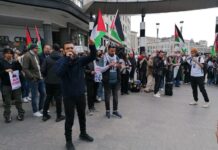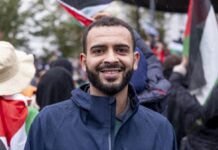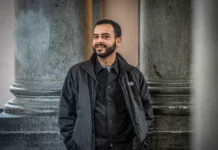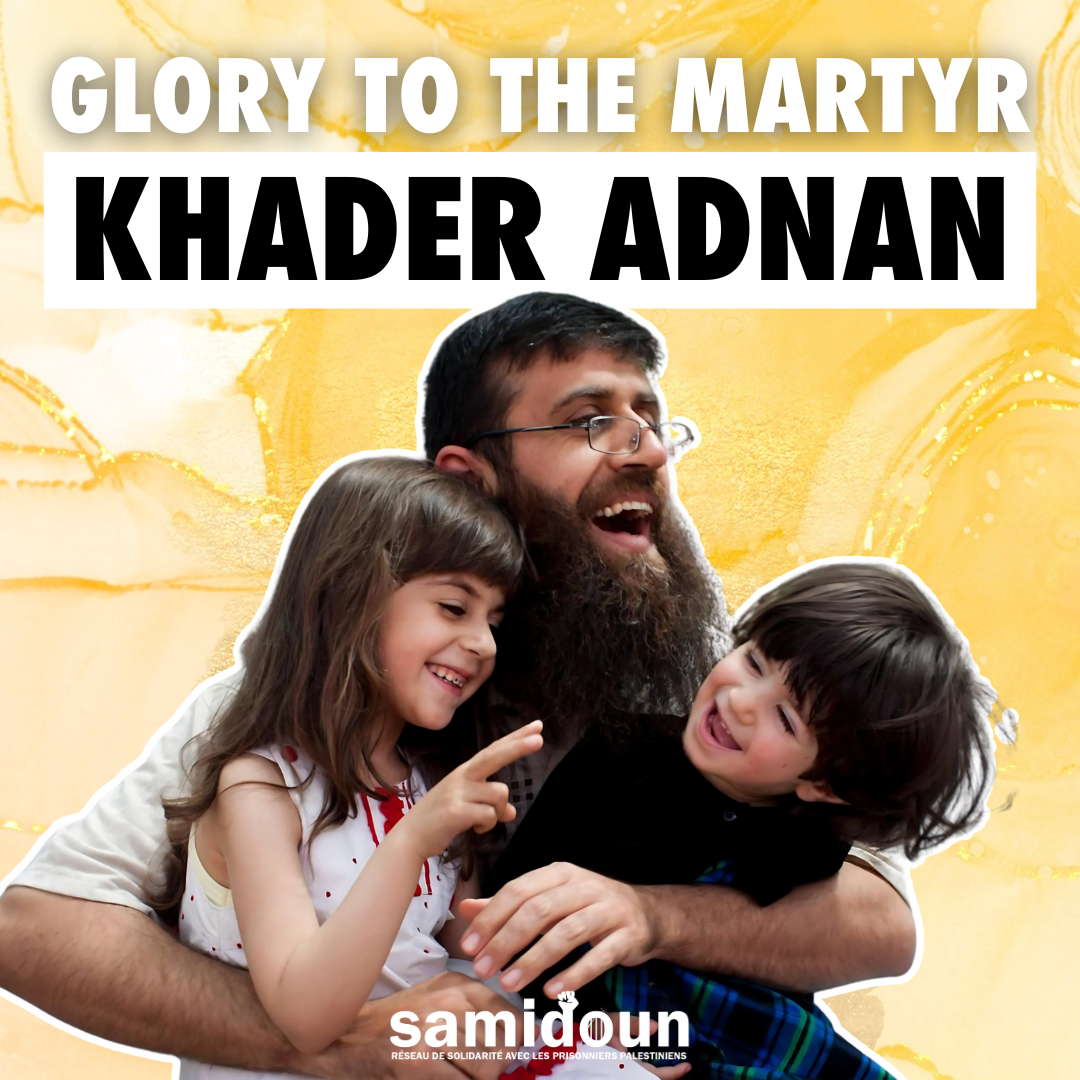
2 May 2025 marks the second anniversary of the martyrdom of Sheikh Khader Adnan, leader of the Palestinian prisoners’ movement, on his 86th day of hunger strike inside the Zionist prisons, deliberately denied medical care in order to ensure his martyrdom. The martyrdom of Sheikh Khader Adnan should be understood clearly as part and parcel of the Zionist assassination policy, meant to silence and erase a symbol of the Palestinian people, the prisoners’ movement and the resistance who, with his dignity, strength and humanity, represented victory over the jailer in his very being.
Khader Adnan, married to Randa Musa, with whom he was the father of nine children (Maali, Beesan, Abdel-Rahman, Hamza, Mohammed, Ali, Maryam, Omar, and Zainab), was a beloved leader in his community, Arraba, Jenin, and among his family, where he was a model of love and warmth. He was a baker, running a grocery and bakery nearby Qabatiya, Jenin, and a spokesperson for the Palestinian Islamic Jihad Movement. He was a tireless freedom fighter who won his liberation from occupation prisons on four separate occasions through his hunger strikes, who sparked a new renaissance in the prisoners’ movement. He was ever-present in the solidarity tents supporting hunger strikers, in the funerals of every martyr, by the side of every liberated prisoner when they gained their liberation. Every prisoner and every prisoner’s family could count on the support of Sheikh Khader Adnan. He attended, led and spoke at all of the demonstrations, whether large or small, in support of the prisoners’ movement, demanding liberation, and confronting the so-called “security coordination” of the Palestinian Authority, a relentless voice of conscience and resistance.
His martyrdom, indeed, his assassination behind bars, sparked an immediate response from the resistance in Gaza as well as a series of assassinations targeting the Islamic Jihad movement’s leadership. In the Battle of the Revenge of the Free in May 2023, despite the painful assassinations of the martyred leaders, the resistance held its ground in Gaza, striking powerful blows against the occupier and renewing its leadership for the next stage of struggle, which we see today in the Al-Aqsa Flood and the resistance to the ongoing Zionist-imperialist genocide.
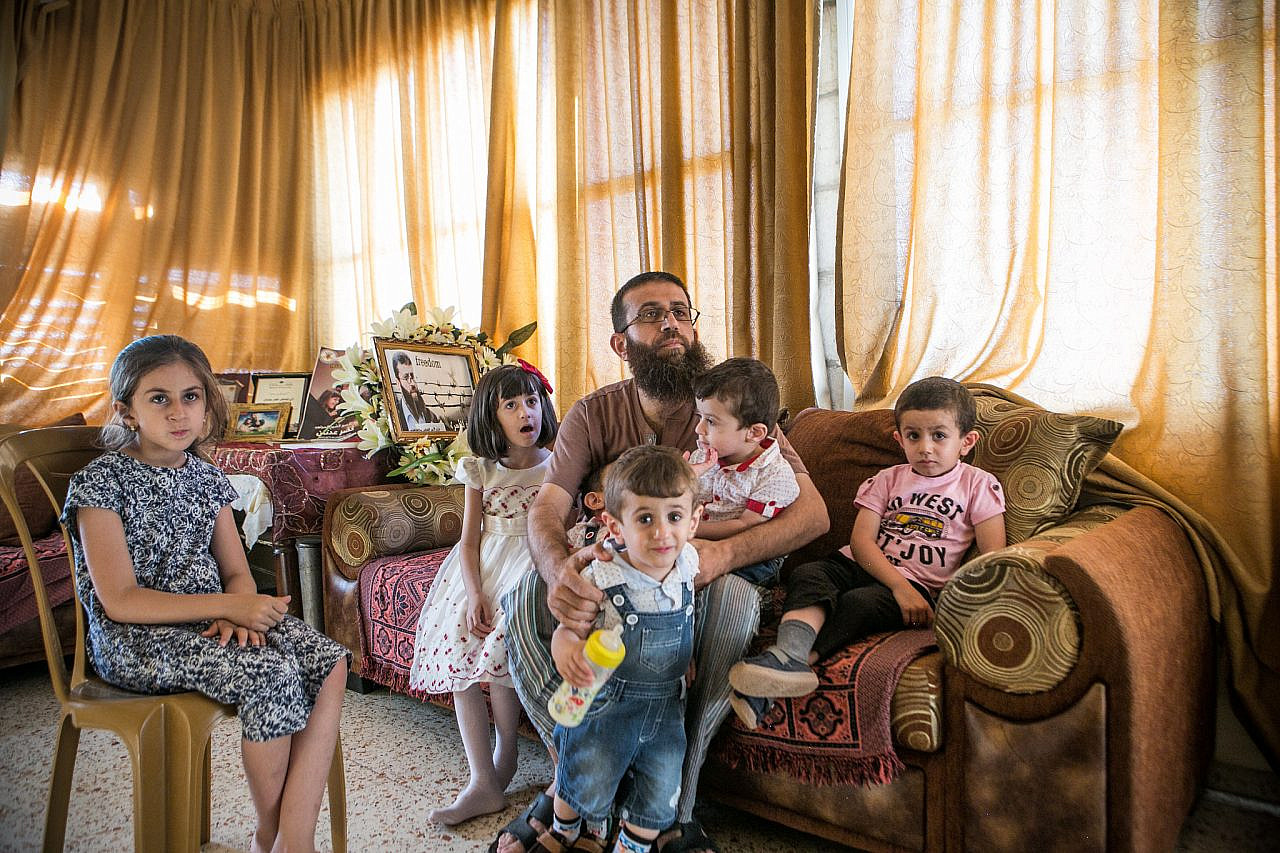
Today, Sheikh Khader Adnan’s body remains imprisoned by the occupation, one of nearly 700 Palestinian martyrs’ bodies, including 75 Palestinian prisoners’, held hostage by the occupier. His spirit lives on in the spirit of resistance that continues to drive the prisoners’ movement forward under the most severe forms of torture and abuse; in every action of resistance that rises from the villages, refugee camps and cities of the West Bank; in every march, protest and demonstration that insists that Gaza will not be left alone; and, of course, on the streets, among the displaced, and in the tunnels of resistance in Gaza, fighting against the genocide. Sheikh Khader Adnan lives on in every action taken around the world, by Palestinians and Arabs in exile and diaspora, and by the international movement against imperialism and for Palestinian liberation, that exposes the occupation and its imperialist backers and imposes a material cost upon them.
Khader Adnan and the Palestinian Prisoners’ Movement
Khader Adnan was arrested 15 times throughout his life — 12 times by the occupation and three times by the Palestinian Authority, as part of its “security coordination” collaboration with the Zionist regime, and he served eight years in the occupation’s prisons. Born on 24 March 1978 in Arraba, near Jenin, in the West Bank of occupied Palestine, he attended Birzeit University after completing high school, where he studied mathematics and became deeply involved with the Palestinian liberation movement. As a student, he joined the Islamic Jihad Movement in Palestine in 1996 and became a spokesperson for the movement, rallying fellow students to confront the so-called “Oslo peace process” and struggle for the liberation of Palestine.
Mona Qa’adan, the liberated prisoner, recalled: “Khader possessed a security, political, and cultural awareness from the very beginning of his involvement with the Islamic Jihad movement, which increased his effectiveness in all arenas, starting with Arraba, then Birzeit University, and extending to other cities.”
He was first detained by the occupation in 1999, spending four months in Zionist administrative detention, imprisonment with no charge or trial on the basis of a so-called “secret file,” which neither the detainee nor their lawyer can access. Administrative detention orders are indefinitely renewable, and as a result, Palestinians routinely spend years at a time imprisoned under these arbitrary orders. Currently, over 3,600 out of over 10,000 Palestinian political prisoners in Zionist jails are held under administrative detention orders, which are often used to target community leaders and activists, including in the student movement, the women’s movement, land defense movements and other social movements.
In February 2000, he was arrested for the first time by the Palestinian Authority, after an incident that has since become famous in the history of the student movement at Birzeit University. Lionel Jospin, then the French prime minister, visited Birzeit only days after he condemned Hezbollah and the Lebanese resistance to Zionist occupation of the south of Lebanon — months before they were to achieve the complete liberation of their land on 25 May — as “terrorist.” Khader Adnan was the first student to stand up and denounce Jospin, inspiring his fellow students to hurl shoes and rocks at Jospin, expelling him from the university.
It was during this detention by the Palestinian Authority that he launched his first hunger strike — for 10 days — demanding his liberation, which would become a powerful weapon in the struggle against unjust imprisonment, and a tactic with a lengthy history in the Palestinian prisoners’ movement.
In 2002, amid the height of the Al-Aqsa Intifada, he was arrested again by the occupation, held in administrative detention for a year. Only six months after his release in 2003, he was abducted once more, this time being held in solitary confinement. Mohammed al-Qeeq, who would later himself become a hunger striker in the occupation prisons, recalled Adnan’s resistance from early on: “I met Adnan during my second arrest in 2004, when Israeli soldiers transported us in a bus from Megiddo prison in northern Palestine to the Negev (Naqab) in the south.
The soldiers insulted the prisoners on the bus, and Adnan protested angrily. After we arrived – following six hours of fatigue and exhaustion, sitting on metal seats – he refused to get off the bus as a protest against this treatment, and they ultimately returned him to Megiddo.”
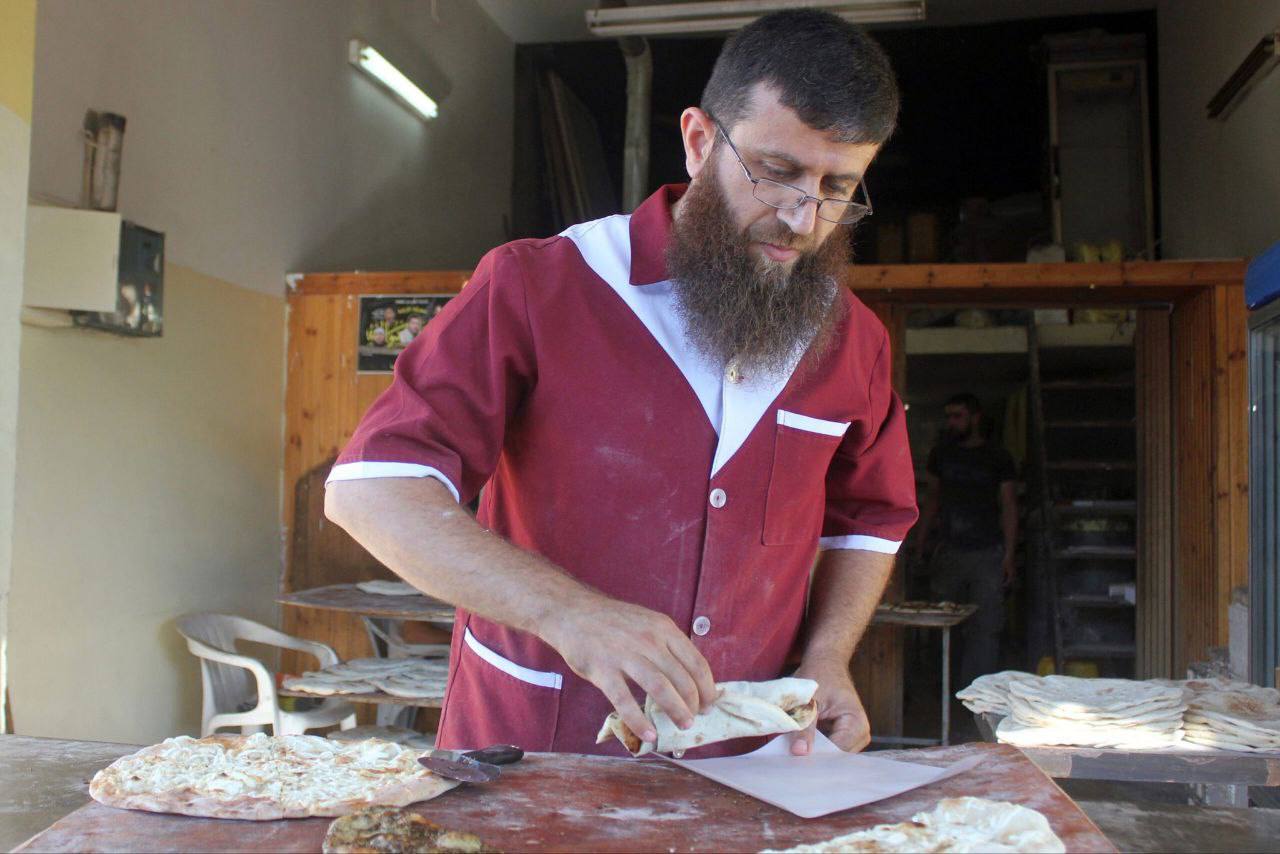
In 2005, he married his wife Randa; before they married, they had a serious conversation about which Randa later said: “He told me that his life was not normal, that he might be around for 15 days and then be gone again for a long time. But I always dreamed of marrying someone strong, someone who struggles in defence of his country. I am proud of him whether he is under the ground or above it.”
Only months later, in August 2005, Khader was once again seized by the occupation forces; this time, he was held in administrative detention without charge or trial for 15 months before he was released. During this time, he launched his second hunger strike for 25 days in Kfar Yona prison to demand his release from solitary confinement — and won. When he was finally released, Khader and Randa had their first child, Maali, in 2008, who would be followed by eight more brothers and sisters, including a set of triplets. In March 2008, once again, he was arrested and ordered to administrative detention for another six months; and in October 2010, it was once again the Palestinian Authority arresting and imprisoning him for his ongoing political activity and clarity, refusing normalization and collaboration with the occupier.
Khader Adnan’s Hunger Strikes for Freedom
On 17 December 2011, occupation forces once again invaded the Adnan family’s home at 3:30 in the morning, abducting Khader and ordering him to administrative detention once more. His arrest came two months after the Palestinian Resistance had achieved the Wafa al-Ahrar exchange, liberating 1,027 Palestinian prisoners from the occupation prisons in two releases, in October and December 2011. When the Wafa al-Ahrar exchange was announced on 18 October 2011, hundreds of Palestinian prisoners were engaged in an open-ended hunger strike launched on 27 September against the solitary confinement and isolation of Palestinian leaders, especially Ahmad Sa’adat, the imprisoned General Secretary of the Popular Front for the Liberation of Palestine. The strike was suddenly interrupted with stunning news: a prisoner exchange agreement had been released between the Palestinian resistance and the Israeli occupation.
This time, Sheikh Khader Adnan launched an individual hunger strike from the moment of his arrest, a strike that would last 66 days, galvanize the Palestinian streets, motivate international solidarity and launch a series of individual hunger strikes as well as leading to the 17 April 2012 collective Karameh strike.
As he continued to refuse food under interrogation, he was subjected to brutal abuse, as documented by Addameer:
Though he was arrested at 3:30 in the morning, Khader was kept shackled until 8:30 am, at which point he was transferred to Megiddo prison. On his first day under arrest, Khader began a hunger strike in protest of his detention. The following morning, he was taken to Al-Jalameh interrogation center. Upon arriving to Al-Jalameh, Khader was given a medical exam, where he informed prison doctors of his injuries and told them that he suffered from a gastric illness and disc problems in his back. Instead of being treated, he was taken to interrogation immediately.
Four interrogators began to insult and humiliate him, especially using abusive language about his wife, sister, children and mother. On the first day of interrogation, he answered general questions despite the continuous spate of insults. After the first session, however, Khader stopped responding and began a speaking strike because of the interrogators’ use of increasingly graphic language. Interrogation sessions continued every day for the next ten days, excluding Mondays.
On his fourth day of interrogation, the Israeli Prison Service (IPS) sentenced him in his cell to seven days of isolation due to his hunger strike. In order to further punish him without being required to go to court, the IPS also banned him from family visits for three months, revealing a pre-intention to keep him in detention upon completion of his interrogation. Khader was placed in an isolation cell in a section of the prison shared with Israeli criminal prisoners. On one occasion, a force of soldiers raided his cell in the middle of the night and strip-searched him. While in the isolation period, Khader continued to be under interrogation daily.
Each day, Khader was subjected to two three-hour interrogation sessions. Throughout the interrogation sessions, his hands were tied behind his back on a chair with a crooked back, causing extreme pain to his back. Khader notes that the interrogators would leave him sitting alone in the room for half an hour or more. Khader also suffered from additional ill-treatment. During the second week of interrogation, one interrogator pulled his beard so hard that it caused his hair to rip off. The same interrogator also took dirt from the bottom of his shoe and rubbed it on Khader’s mustache as a means of humiliation.
On Friday evening 30 December 2011, Khader was transferred to Ramleh prison hospital because of his deteriorating health from his hunger strike. He was placed in isolation in the hospital, where he was subject to cold conditions and cockroaches throughout his cell. He has refused any medical examinations since 25 December, which was one week after he stopped eating and speaking. The prison director came to speak to Khader in order to intimidate him further and soldiers closed the upper part of his cell’s door to block any air circulation, commenting that they would “break him” eventually.
Over the weeks of his strike, his face on posters, or captured in a graffiti stencil designed by the Palestinian artist (later himself imprisoned) Hafez Omar, Khader Adnan’s hunger strike brought the situation of Palestinian prisoners and their ongoing struggle into vivid relief on a global level, inspiring solidarity hunger strikes around the world, from campuses to communities, and mass protests on the streets of Palestine. On 15 February, a group of Palestinian leaders, including Sheikh Nafez Azzam, Daoud Shihab, Khader Habib and Ahmed Mudallal of Islamic Jihad, went on a solidarity hunger strike, declaring that it is the “least we can do for this legendary symbol,” while Palestinian Prime Minister Ismail Haniyeh declared in Gaza: “The Palestinian people, with all its components and its factions, will never abandon the hero prisoners, especially those who lead this hunger strike battle.” Thousands of young Palestinians surrounded Ofer prison on 16 February 2012, and one day later, over 5,000 Palestinians gathered in Gaza City to chant, “We are all Khader Adnan!”
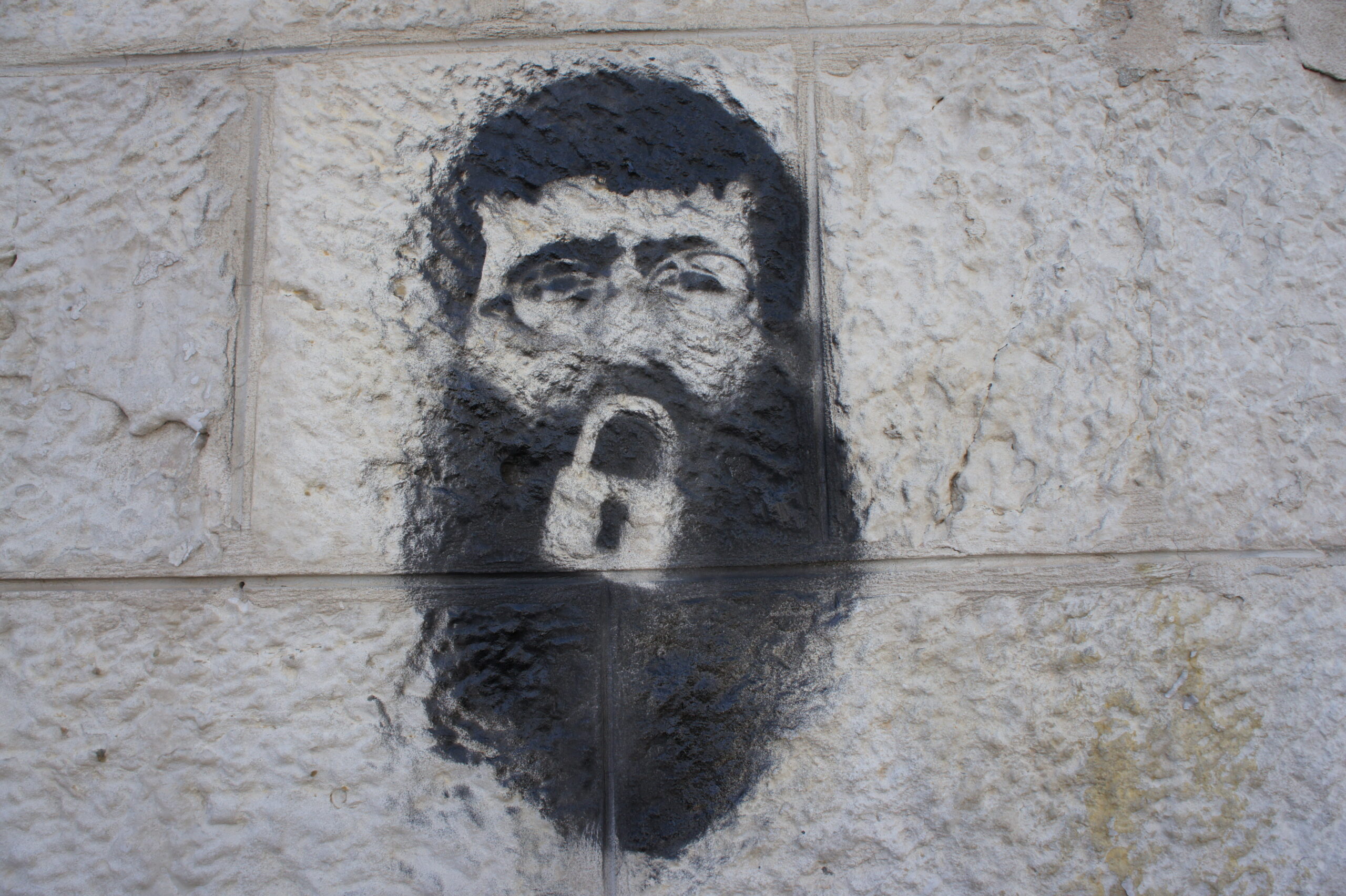
During his strike, he lost 30 kilograms (over 60 pounds) of weight. His skin yellowed, he was unable to move, and his voice faded. He was transferred to isolation, then from prison to prison, and then to hospital. His lawyers appealed his four-month administrative detention order, only to be met with denial after denial, until his steadfastness triumphed over the jailer. On 22 February 2012, after 66 days of hunger strike, he announced that he would be liberated on 17 April — Palestinian Prisoners’ Day — with no extension of his detention.
The victory of Sheikh Khader Adnan reverberated throughout the Zionist prisons, sparking a wave of individual hunger strikes: Hana’ Shalabi, Bilal Dhiab, Thaer Halahleh, Mohammed al-Qeeq, Jaafar Izzedine, Mahmoud Sarsak, Mohammed Allan, Hassan Safadi, Hisham Hawwash, Maher al-Akhras, and dozens of others. On 17 April 2012, as Khader was liberated from the occupation prisons, thousands of Palestinian prisoners began the collective Karameh (Dignity) strike, with a series of demands, including the liberation of the prisoners’ movement leadership from solitary confinement; it achieved its major demands in 28 days. When he was released, he visited the homes of the prisoners in Arraba and nearby villages before returning to his own home, emphasizing that his individual strike was a collective action with a collective vision for liberation. This would begin his journey to nearly every demonstration or action for a prisoner or a martyr, everywhere he could attend in Palestine.
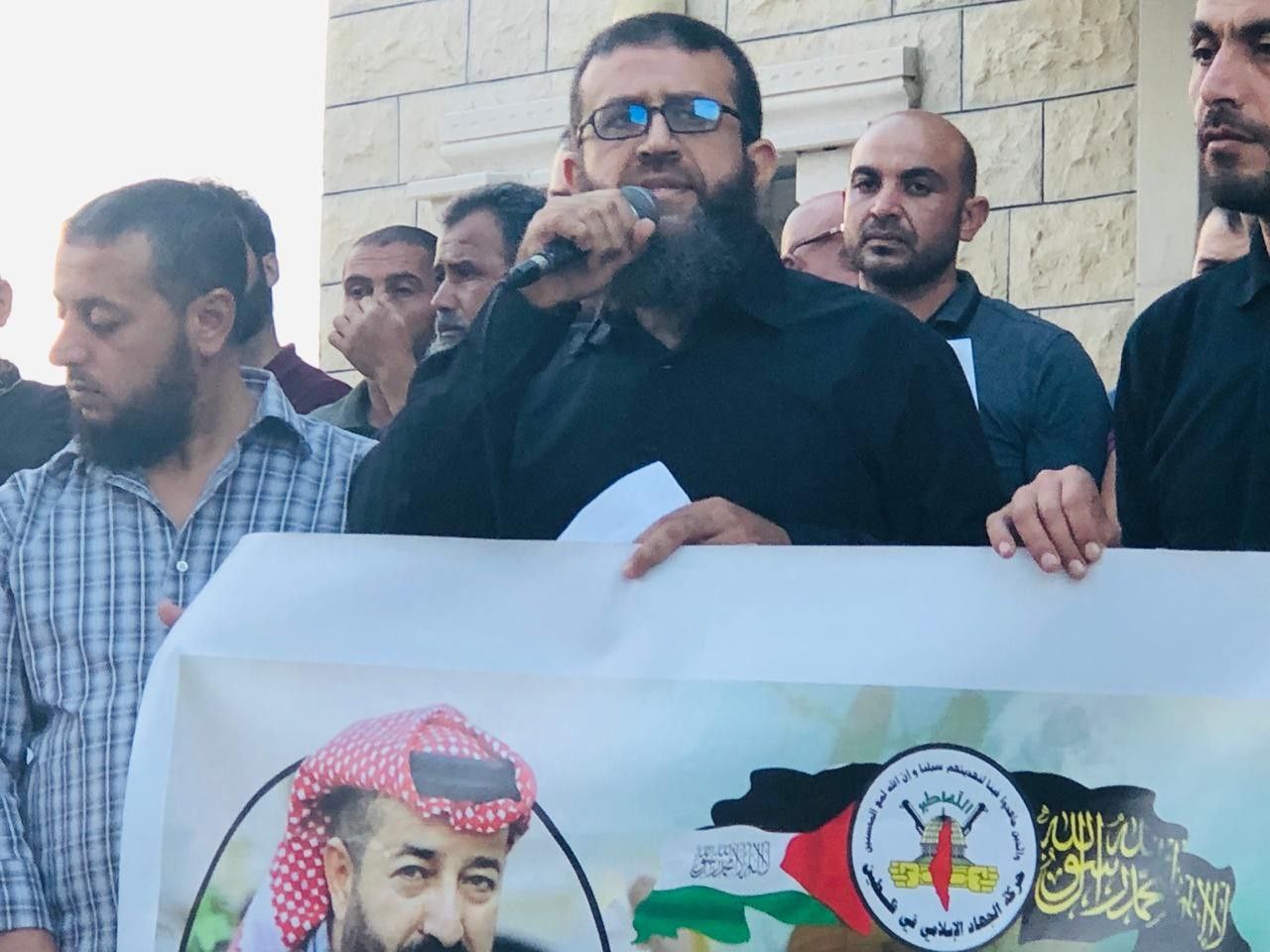
Sheikh Khader Adnan became a Palestinian, Arab and international symbol of steadfastness, courage and commitment. He showed that it was indeed possible to defeat the jailer, despite its military force and the backing of the imperialist powers, and sparked an upsurge in the Palestinian prisoners’ movement, both inside the prisons and outside them. Around the world, thousands of people first learned about the struggle of Palestinian prisoners because of Khader’s strike.
After his liberation, Khader was a constant presence in the homes of prisoners on hunger strike, in solidarity tents for imprisoned freedom fighters, in the mourning houses of the martyrs, and on the streets of Palestine, a symbol of victory and steadfastness.
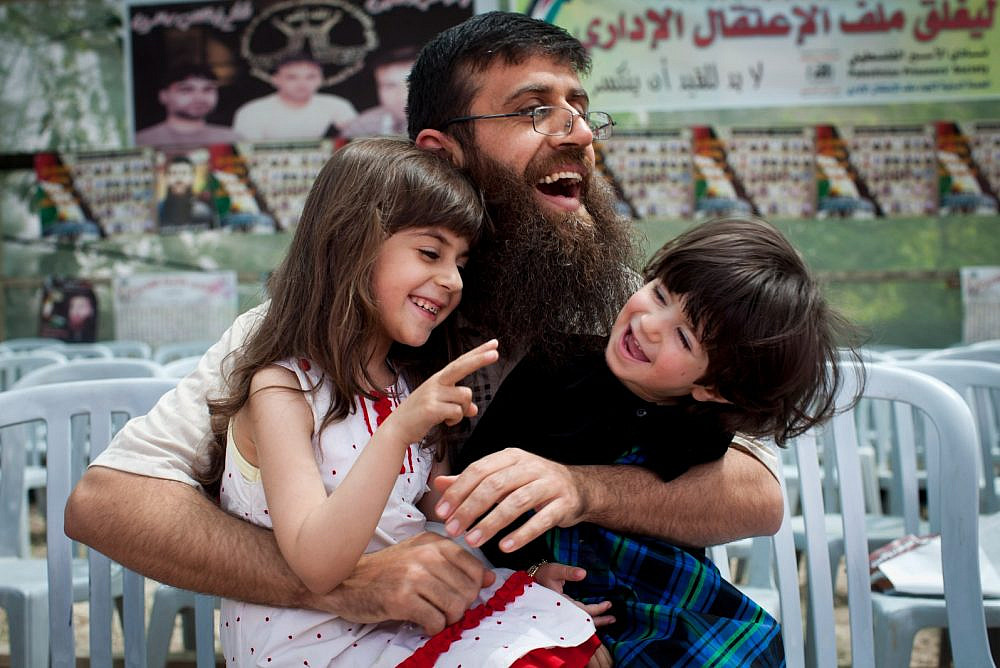
Of course, the Zionist regime did not cease its attacks on Khader, but he continued to achieve victories over the jailers in the years to come. He was briefly detained by the Palestinian Authority on 27 November 2013 as he attempted to protect his cousin, Farouk Musa, from detention by the same PA forces engaged in “security coordination” with the occupation. On 8 July 2014, as the occupation launched its latest assault on the Palestinian people in Gaza, they also arrested him for the 10th time. His sister reported that the occupation forces celebrated with glee as they abducted the symbol of their defeat. He was incarcerated in an attempt to prevent him from playing his charismatic and effective role among the Palestinian masses to build support for the people and the Resistance in Gaza. Once again, he was ordered to administrative detention, without charge or trial, which was renewed once again in January 2015. When the occupation announced the third renewal of his administrative detention on 5 May 2015, he immediately announced his hunger strike, declaring that he would consume only water and salt until his freedom. During his strike, Gilad Erdan — later the infamous UN ambassador of the Zionist regime amid the genocide in Gaza — promulgated legislation ordering doctors to force-feed Palestinian hunger strikers, declaring that the hunger strikes were a “new kind of suicide attack that would threaten the State of Israel.”
Once again, after 56 days of hunger strike, Sheikh Khader Adnan defeated the jailer. He returned home to Arraba on 12 July 2015, surrounded by crowds welcoming him and saluting his newest victory, amid the burgeoning al-Quds Intifada developing in Jerusalem. Just days later, he was arrested going to Jerusalem, only to be released once more.
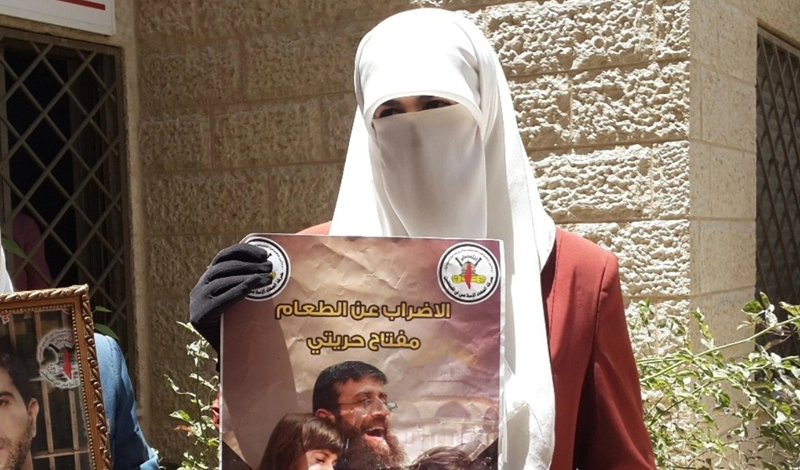
On 4 January 2016, occupation forces arrested him near the town of Silwad near Ramallah and was again released. However, on 9 October 2016, Khader Adnan, together with fellow liberated hunger striker Mohammed Allan, Maher al-Akhras and others, was again arrested by the Palestinian Authority when they went to greet liberated prisoner Hussein Abu Obeideh in the village of Sarra, near Nablus. Individuals associated with the Fateh movement attacked the delegation with sticks and other weapons; the PA forces then intervened by arresting the liberated prisoners and holding them in Junaid prison for hours. The people of the village gathered around Adnan and his comrades to protect them, but were themselves threatened with arrest. Islamic Jihad responded by saying that the PA security forces have “crossed all red lines…this attack on the sons of the movement proves their loyalty to the Israeli occupation and security coordination.”
On 11 December 2017, once again, the occupation invaded the home of the Adnan family in the early morning hours, beating and interrogating Khader inside his home before abducting him, holding him and seeking a sentence of at least five years against him for membership in the Palestinian Islamic Jihad Movement. On 2 September 2018, after his trial had been postponed 17 times, he once again launched a hunger strike to demand his liberation. Randa, his wife, wrote at the time: “Many have criticised him for choosing to go on hunger strike against a court case; they described it as a death wish. Rights organisations told me that they would not support me if he did this. But who are they to choose or decide what he protests against? Who are they to decide that what the occupation is doing is legal? He has been in prison for almost a year, and no ruling has been issued.
His principal belief is that the occupation is free to decide when to imprison someone, but the occupation is not free to decide when to release a political prisoner. The idea in this hunger strike is that he is against the essence of detention. Any free person with even a shred of dignity would resist the cruelty of the occupation.”
And, once again, on his 58th day of hunger strike, Khader Adnan again defeated the jailer. Suddenly, his trial was no longer postponed, and on 29 October, at the Salem military court, Adnan was sentenced to one year in prison from the date of his arrest, 11 December 2017, and a fine of 1,000 NIS ($270 USD). On 13 November, just two weeks later, Sheikh Khader Adnan once again returned home, victorious, to Arraba, and clearly affirming that resisting the “charges” of the illegitimate entity was also susceptible to the will of the Palestinian prisoners’ movement.
On 5 May 2021, once again the occupation forces abducted Khader Adnan, amid the burgeoning Unity Intifada/Battle of Seif al-Quds, after he was seized at a military checkpoint near Nablus. He immediately launched a hunger strike, which he continued for 25 days, until he was released, once again, breaking the will of the jailer.
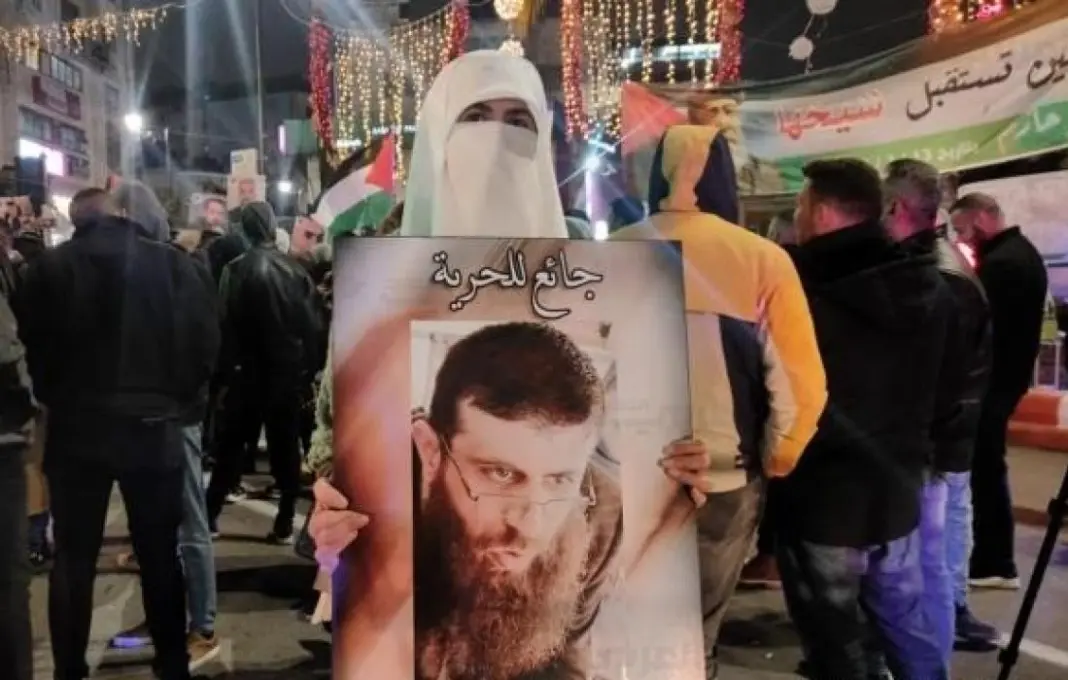
And on 5 February 2023, Sheikh Khader Adnan was once again seized by the occupation forces, and launched a hunger strike, which he maintained, even as, once again, they charged him with membership in an “illegal organization” (the Islamic Jihad movement), and with “incitement,” for his speeches throughout the West Bank about the prisoners, the martyrs, and the burgeoning armed resistance. Once again, he launched his hunger strike. Randa Adnan issued an urgent call to the world as his strike stretched on.
“My message to the free people of the world and the United Nations is to take action and pressure the occupation to require it to respect human rights, to stop the inhumane treatment of Palestinian detainees, to help my children and me to visit Khader, to save the life of my husband and their father from the slow death he is experiencing, and to release him before it is too late.
I thank everyone who has supported my husband since the first moment of his hunger strike; however, I will not forgive anyone who could have done something to lift this injustice off of my husband, yet they did not. My husband, Khader Adnan, represents the message of a nation and wages this struggle on behalf of his people. He does not like hunger or death but refuses a life of humiliation and fights for freedom and dignity.”
The martyrdom of Sheikh Khader Adnan, the symbol of dignity, freedom and steadfastness, was an Israeli assassination, carried out with forethought and premeditation. When he collapsed on 2 May 2023, surrounded by surveillance cameras, in the so-called Ramleh prison clinic, occupation guards and staff waited over 30 minutes to enter the room — essentially, waiting for his death. It was clear for the months of his 2023 strike that the occupation was determined to eliminate this symbol of prisoners’ resistance and Palestinian sacrifice and commitment and love for his people and land.
The Prisoners’ Media Office emphasized, on the second anniversary of his martyrdom:
“In every strike, Khader was not only challenging his jailers, but also uttering the name of thousands of silent prisoners behind the walls, and reaching their voice to the world through his lean body and empty stomach…
Although two years have passed since his martyrdom, the name Khader Adnan is still alive in the memory of the Palestinians, especially in the cells. Khader did not die, but his steadfastness was distributed to the bodies of thousands of prisoners, and his strike became a school that inspires the resistance.”
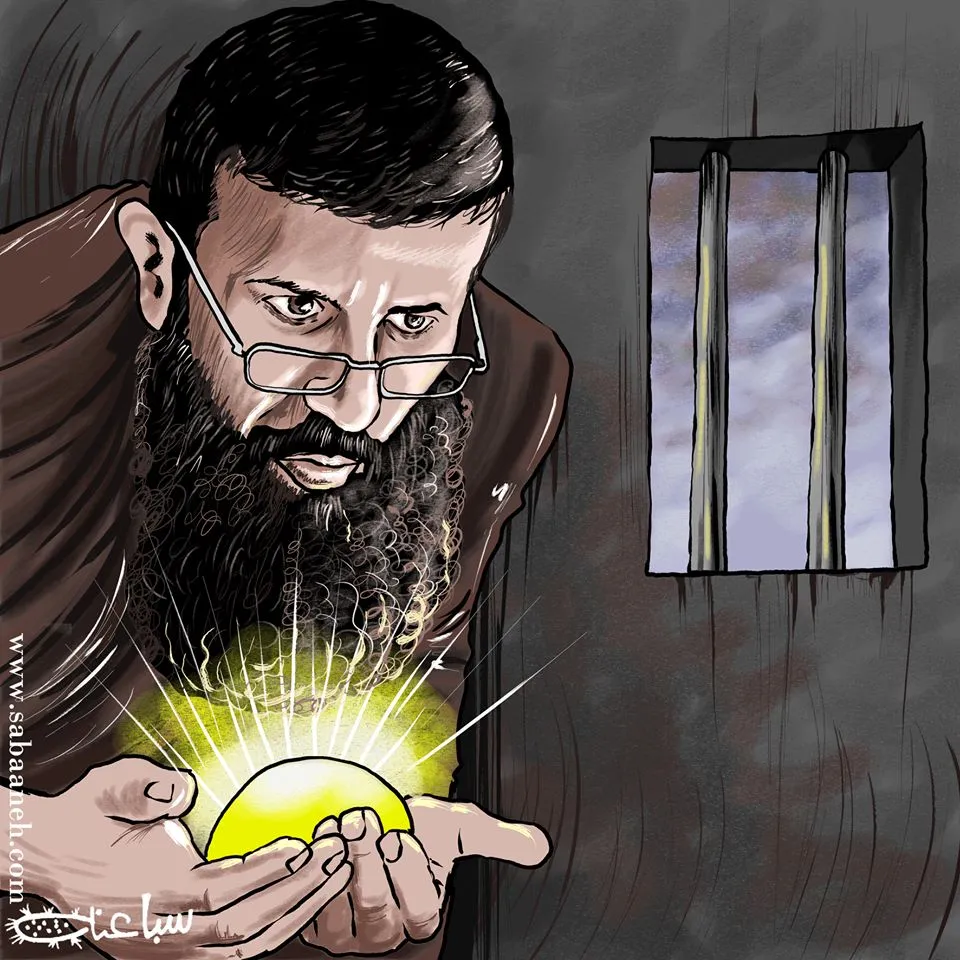
While Khader Adnan is perhaps the most famous advocate and practitioner of what has been termed the “individual hunger strike,” it is important to note here that his actions were not individualistic, random or disconnected. Instead, they were part of a profoundly collective effort to revive and advance the Palestinian prisoners’ movement, and the Palestinian prisoners at the center of the Palestinian national liberation movement.
Sheikh Khader Adnan was an organized Palestinian who developed both within and beyond his movement, and who believed deeply in national unity, which he put into practice in his support for the martyrs and the prisoners. He was a man of collective vision who dedicated his actions to the strategic development of the prisoners’ movement and its advance to a new stage of struggle, a development that came alongside that of the armed resistance in the camps in the West Bank — today under brutal assault — and of course, in the heart of Palestine’s resistance in Gaza.
“Khader was a community man, he knew how to mobilize,” Randa said in an interview. “His strategy was the mobilization of the collective. He ensured that when we went to support detainees or hunger strikers or when we would attend vigils, that all of us would go, the whole family. It was a collective act.”
To inscribe his actions as merely “individual” strikes is to misunderstand that his actions were always met with firm support from his comrades. The Islamic Jihad Movement did not launch dozens of missiles at the occupying entity in response to his assassination simply because he was a prominent individual, but because he was a truly collective and organized struggler, at the heart of the resistance in all of its forms.
The history of the prisoners’ movement over the past two decades is deeply intertwined with that of Sheikh Khader Adnan. Just as his complete refusal to confess or to engage with the interrogators has its roots in the long history of rejecting confession, and engaging in the “strategy of confrontation behind bars,” the road to the Freedom Tunnel, when six Palestinian prisoners in Gilboa prison — five of them Islamic Jihad strugglers from Jenin — also runs through the years of struggle in the prisons exemplified by his repeated hunger strikes, aiming not only for his freedom but to return the prisoners’ movement to the center of the cause.
Similarly, it is clear that, alongside the Battle of Seif al-Quds/the Unity Intifada, the Freedom Tunnel – and, of course, the Wafa al-Ahrar prisoner exchange accomplished by Hamas and the Al-Qassam Brigades in 2011 – is one of the immediate forebears of Al-Aqsa Flood. The Freedom Tunnel exposed the illusory nature of the occupation’s proclaimed technological and intelligence superiority and inspired collective hope and optimism in Palestine and around the world about the future of the Palestinian cause, while raising an urgent call for the liberation of the prisoners from the dungeons of the Zionist regime.
Khader Adnan’s Political Clarity
In 2015, upon his liberation, Sheikh Khader Adnan said: “The prisoners’ movement and hunger strikes in particular are a symbol of the principle and demand for justice in Palestine. It proves that of course it is both possible and necessary to break the Israeli occupation….But we need the unity of the Palestinian national movement. We need to fully convince the official bodies, the leadership and the public of the need for resistance. We need to weld all our energies together, from Jerusalem, Gaza, the West Bank, and the diaspora. We need the unification of all these energies with the free people of the world in defence of the rights of prisoners and all Palestinians.”
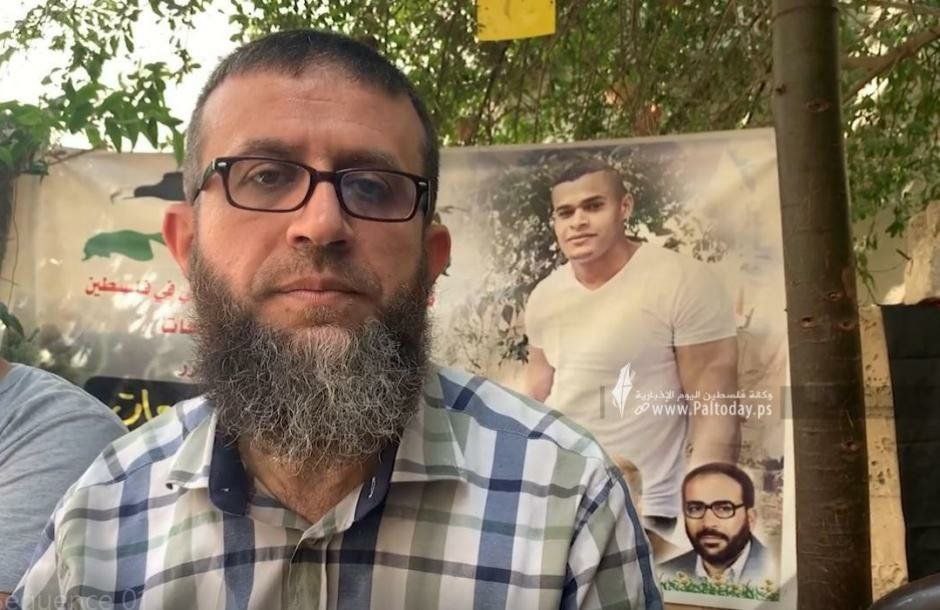
From his first public, visible statements, challenging then-French Prime Minister Lionel Jospin for his colonial attack on the Lebanese Resistance, he expressed a clear, consistent vision of Palestinian liberation, and an inclusive view of the struggle, as he urged a complete break with the path of Oslo — that of “security coordination,” collaboration with the occupier, and comprador rule.
Indeed, his role in the student movement has continued to inspire generations of students, who not only protested at campuses across Palestine and around the world during his hunger strikes, but who continue to recall his own legacy of student struggle. The 2023-24 Birzeit Student Council — whose leaders were themselves subjected to imprisonment and administrative detention — named themselves the class of the martyr Khader Adnan, with his image on the documents and posters of the student movement.
He was also determined to defend the unity of the Palestinian people in all of their locations; in a 2012 interview upon his liberation, he said:
“My stance will always be with the prisoners, whether next to them, behind them, or in front of them. From the Gaza Strip to the West Bank to the ’48 territories and the exile, every Palestinian is obliged to stand united.
We are all the children of the same cause, and one people living under the same occupation. I saw so much support from our family in 1948 Palestine, from the Palestinian doctors and nurses, the Palestinians in Haifa, the school girls from Nazareth who wrote an assignment on me … I will never forget their love.”
In 2017, Khader Adnan marched in the funeral of Basil al-Araj, the Palestinian fighter, intellectual and activist who took up the path of resistance and had been imprisoned by the Palestinian Authority, going on hunger strike for his freedom and that of his comrades, before being martyred in a battle with the occupation forces. He and al-Araj’s father were attacked by Palestinian Authority forces as they protested later in Ramallah against the PA’s attempt to try the martyr and his comrades. On that occasion, he directed a message to the PA: “If one day I become a martyr, let none of them approach my body, do not enter our homes, do not join our mourning, our condolences, or our celebrations, because you hold more hatred and audacity towards us than the occupation.” And, as Resistance News Network stated, “Indeed, the forces of the PA attacked a march of rage condemning Sheikh Khader’s assassination, not even 24 hours after his martyrdom.”
The Palestinian student movement also linked the three martyrs, in a banner hung to honor Nizar Banat, Basil al-Araj and Khader Adnan, and their legacy of struggle to correct the compass of the Palestinian cause, toward return and liberation.
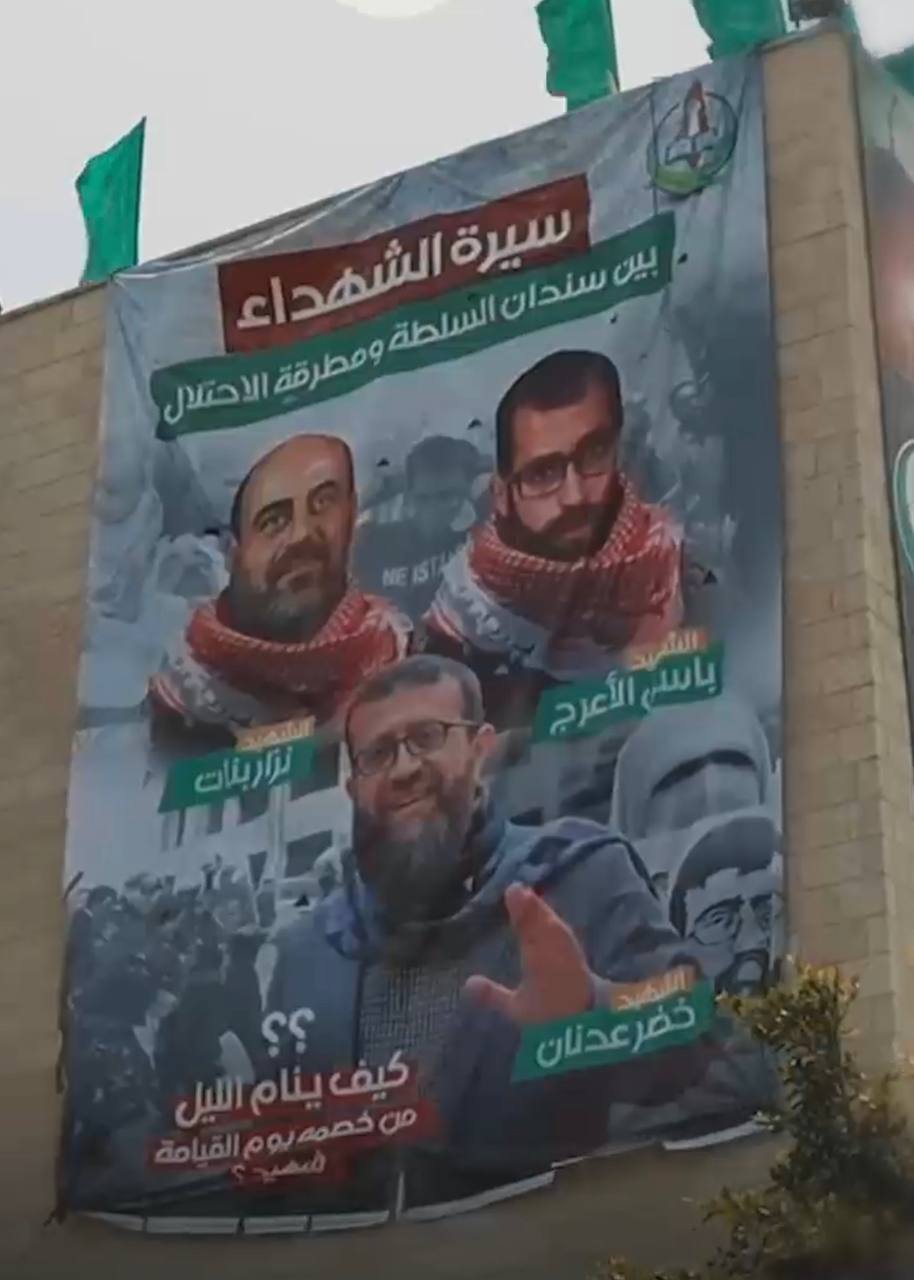
In February 2022, when Khader went to visit the families of three martyrs in Nablus assassinated by the occupation, he was himself subjected to an assassination attempt by elements linked to the Palestinian Authority, recalling the earlier 2016 attack. While he was unharmed, the brothers of the martyrs were injured. He said that “mercenaries” had fired upon them, and recalled the assassination of Nizar Banat, saying, “Whoever killed Nizar Banat tried to kill me.” He spoke about his early arrests by the Palestinian Authority, noting that when he was imprisoned in Jericho prison as a student, he was thrown around, slapped and held with a bag over his head. He said, “I was arrested in the occupation prisons and went on a hunger strike just like I did in Areeha… The years have passed, the arrests [by the PA] have been repeated, and they have turned into assaults and attempts [on my life] in civilian clothes. The PA advanced, developed, demonized, and incited… They killed Nizar. Today, they want to kill us by distributing false accusations and inciting the homes of martyrs, prisoners, the wounded, and through remote surveillance.”
These physical assaults were accompanied by attempts to assassinate his reputation and unquestioned moral authority among the families of the prisoners of the martyrs. This is particularly important to recall today, when few would admit to having attacked and spread rumors about the martyred struggler, yet while many of the same forces are actively engaged in a Zionist/imperialist-led campaign of psychological warfare against the Resistance in Gaza — and also in Lebanon, Yemen and throughout the region.
Today, the Palestinian Authority’s President, Mahmoud Abbas, is joining the United States, France, Germany and the Zionist regime in demanding the disarmament of the Palestinian Resistance in Gaza, as it confronts Zionist-imperialist genocide. The Palestinian Authority continues to attack and arrest resistance fighters, seizing and dismantling their weapons in the West Bank, clearing the refugee camps for the invasions of the occupation that have already displaced tens of thousands of Palestinians. Since 7 October 2023, the “Palestinian Authority” has taken the lives of 21 martyrs and arrested hundreds of people for participating in the resistance or even simply speaking and demonstrating for Gaza. The psychological warfare campaign aiming to turn people against the resistance in Gaza and throughout Palestine is not just collaboration, it is aiding and abetting genocide.
Khader Adnan and the Resistance
Ramzy Baroud wrote, discussing the reason for his assassination, “Despite the potential heavy price of Adnan’s death, for Israel, such Palestinians represent a real danger. They are often poor, humble, community-based, yet unifying figures who challenge a political discourse that has been at work since the signing of the Oslo Accords; a process that divided Palestinians into classes, turning brothers into enemies, and allowing Israel to maintain its military occupation and apartheid, unhindered.”
Indeed, he often spoke with great humbleness, including upon his 2012 liberation:
“During my days in the [Meir Ziv] hospital in Safad, occupied pre-partition Palestine, I was reminded of the holiness and the glory of this land. Being close to the resisting countries of Lebanon and Syria all gave me further incentive to defy the Israeli prison authorities, which I don’t recognise.
I have barely presented anything worth of value to the Palestinian cause. I work at a bakery and sell zaatar, and will continue to do so to remind every Palestinian that their roots are deeply entrenched in this land, among the olive trees and the zaatar.“
At the same time, however, he had only the loftiest descriptions for the resistance, the martyrs and the prisoners’ movement, and advanced a clear and uncompromised vision of liberation: “Tel Aviv and other ‘settlement cities’ established on our occupied land will never be a home for the enemy; the fedayeen will expel the occupier, and we believe in God’s promise of victory and empowerment.” He was a spokesperson and a voice for a Palestinian resistance rooted in the popular classes of the Palestinian people, dedicated to the cause of the Palestinian masses and their advancement, and rejecting all those who sought an advantage through collaboration with the occupier.
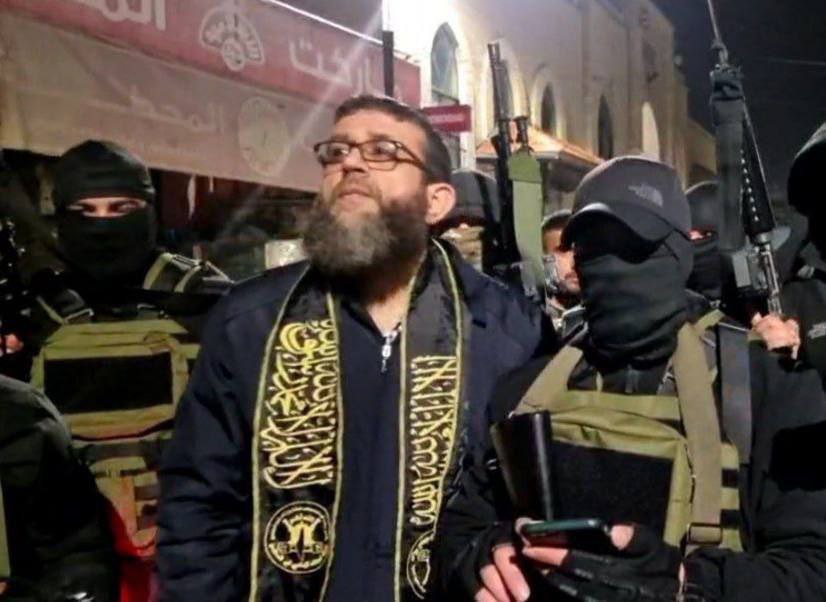
Upon his martyrdom, Palestinian fighters in Gaza with the Islamic Jihad movement fired dozens of rockets into the occupied interior of Palestine, expressing outrage and retaliation for the assassination of a great Palestinian leader. The Zionist regime continued its assassination campaign with a series of assaults on leaders of the Islamic Jihad movement — Tareq Izzedine, himself a liberated prisoner in the Wafa al-Ahrar exchange, and the brother of Jaafar Izzedine, one of the hunger strikers who was arrested for participating in actions to demand Adnan’s release in 2012; alongside Jihad Ghannam, Khaled al-Bahtini, Iyad al-Hassani, Ali Ghali and Ahmed Abu Daqqa, all distinguished mujahideen and resisters who played a leading role in developing the resistance in Gaza as well as the West Bank. This developed into the Battle of the Revenge of the Free, in which the Resistance in Gaza confronted the occupier and its US and European-made weaponry for over a week.
The martyr Tareq Izzedine, of the Islamic Jihad movement, gave his last statement before his assassination on the martyrdom of Sheikh Khader Adnan, himself assassinated through deliberate refusal of medical care in the Zionist prisons. His words remain resonant today (video by Resistance News Network): “Whenever a leader ascends, ten will emerge to replace them. When a martyr ascends, 100 martyrs will emerge to replace them. The march continues, and it does not stop until the defeat of the occupation.”
In 2022, Khader Adnan affirmed, with a message that remains as urgent today in the face of the ongoing and escalating Zionist-imperialist genocide: “Our Palestinian people embrace resistance in every arena. The occupation only understands the language of force and resistance. What the occupation fears most is the resistant spirit of our people who reject the occupation, and the courage our people display in the resistance. We call on our people to join the ranks of the resistance to confront the occupier.”
Khader Adnan and Internationalism
Sheikh Khader Adnan viewed the international aspect of the Palestinian cause, and particularly in support of the prisoners, as highly important, and he never hesitated to develop his solidarity with international struggles. He expressed consistent solidarity with fellow prisoners struggling against injustice, as he did in his message to California prisoners on hunger strike in 2012, and in his message to Irish Republicans who stood with him during his own hunger strike.
Speaking in support of California prisoners on hunger strike in U.S. jails, he said:
The policy of isolation is a cheap weapon in the hands of those who hold power. The policy of isolation is used against American citizens who are victims of the political, economic and social order/system that thrives on greed, discrimination and the deprived, including the African-Americans and Palestinian resistors such as Sameeh Hamoudeh and Sami Al-Arian.
The policy of isolation exposes the ugly face of these false democracies that are guilty of occupation, tyranny and social repression…I announce my full solidarity with my oppressed brothers in the American prisons and I ask that the American people and government end the policy of isolation of the detainees and prisoners, and comply by human rights law that forbids continuous isolation because of its destructive effects on the mental and physical health of detainees.
This echoed his statements from 2012 upon his release, when he said:
The mass hunger strike is a signal to all oppressed and vulnerable people everywhere, not just Palestinians. It’s a message to everyone suffering from injustice, under the boot of oppression. This method will be successful, God willing, and will achieve the rights of the prisoners.
I ask God to move the consciences of the free people around the world. I thank them all, especially Ireland, for they have stood by my hunger strike. I ask them to stand in solidarity with all the Palestinian prisoners on hunger strike in the past, present and future, with our tortured and oppressed people who live under the injustice of occupation day and night.
He urged all who had supported him to support his fellow hunger strikers, “Let all those free and revolutionary join hands against the Occupation’s oppression, and take to the streets – in front of the Occupation’s prisons, in front of its embassies and all other institutions backing it around the world.”

As in his statement in solidarity with California hunger strikers, where he highlighted Palestinian political prisoners in U.S. jails, he did the same in regards to France. When he participated in an event honoring Palestinian political prisoners in Arraba on 28 February 2013, planting seedlings bearing the names of the prisoners, he planted one in honor of Georges Ibrahim Abdallah, the Lebanese Arab struggler for Palestine jailed in France for 40 years, noting that he had returned his meals for five days in solidarity with Palestinian prisoners.

After his martyrdom, in Toulouse, France, the Collectif Palestine Vaincra mirrored this prior event, honouring Khader Adnan, with Palestinian, Arab and internationalist activists planting a jasmine tree in a community garden, accompanied by portraits of Adnan as well as the flag and map of Palestine. Participants delivered a speech in Arabic underlining his commitment and sacrifice for his people and his land.
His hunger strikes drew widespread solidarity from around the world. They exposed many people for the first time to not only the suffering of Palestinian prisoners, but their resistance and steadfastness. Our own development as the Samidoun network was, in part, linked to the development of Sheikh Khader Adnan’s struggles and their international reverberations.
Ameer Makhoul’s comments in 2012 bear important resonance for our movement today: “This battle highlighted the bankruptcy of the discourse of “moderation” which Israel and the US have foisted on the official Palestinian leadership. This moderate stance claims that if we Palestinians wish to secure international support, we must adopt a moderate posture. In practice, this means voluntarily accepting the oppressive controls imposed by the globalized terror of the state. “Moderation” here means abandoning the right to resist the occupying state.
Yet what we have just witnessed is that the world lends support when Palestinians themselves fight back and stand firm, regardless of their political affiliation. The ability to affect and move international public opinion and secure effective wide-scale solidarity was not the outcome of a public relations strategy but of a real struggle on the ground to stand up to the oppressive colonialist machine.”
All of the imperialist powers — the United States, Britain, France, Germany, Canada, and European Union states — that maintain the Zionist project as a base of Western imperialism in the region are fully complicit in the assassination of Khader Adnan, as they have been in the “slow assassination” through torture, starvation, physical and sexual assault, and denial of medical care to over 66 Palestinian prisoners who have been martyred since 7 October 2023 inside the Zionist prisons. There are at least 303 martyrs of the prisoners’ movement since 1967 (data is not compiled for the period 1948–1967). The occupation continues to imprison his body, as it does the bodies of hundreds of Palestinians, including at least 75 martyred prisoners—64 of them since the launch of the Al-Aqsa Flood.
And his martyrdom was mourned around the world. In Ireland, the Bobby Sands Trust also issued a statement mourning Adnan’s death, offering condolences to Adnan’s wife and family, and Anti-Imperialist Action honored both Khader Adnan and Bobby Sands, the martyr of the Irish Republican prisoners’ movement who died in British prison on 5 May 1981, at their protest against the coronation of British king Charles.
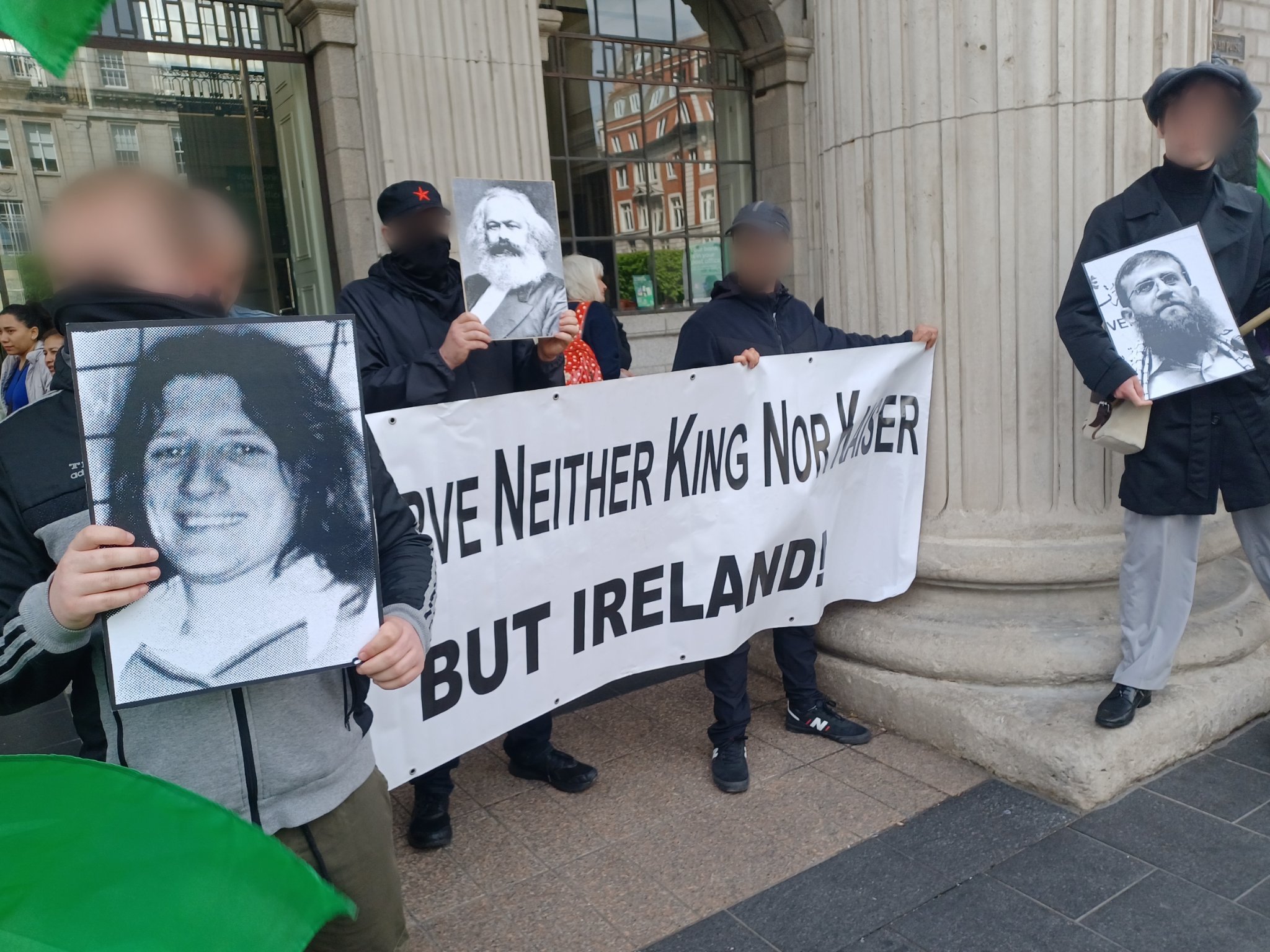
In Tehran, Iran, days after people gathered in Filistin Square to mourn Adnan, a large banner mural was hung honoring his commitment to the liberation of Palestine.

In Germany, murals, posters and graffiti remembering Adnan were found on the streets of Berlin and Dusseldorf, only to be followed almost immediately by the deployment of troops of Berlin police to remove the image of Khader Adnan from the wall, indicating how even his image continued to terrify the imperialist powers.

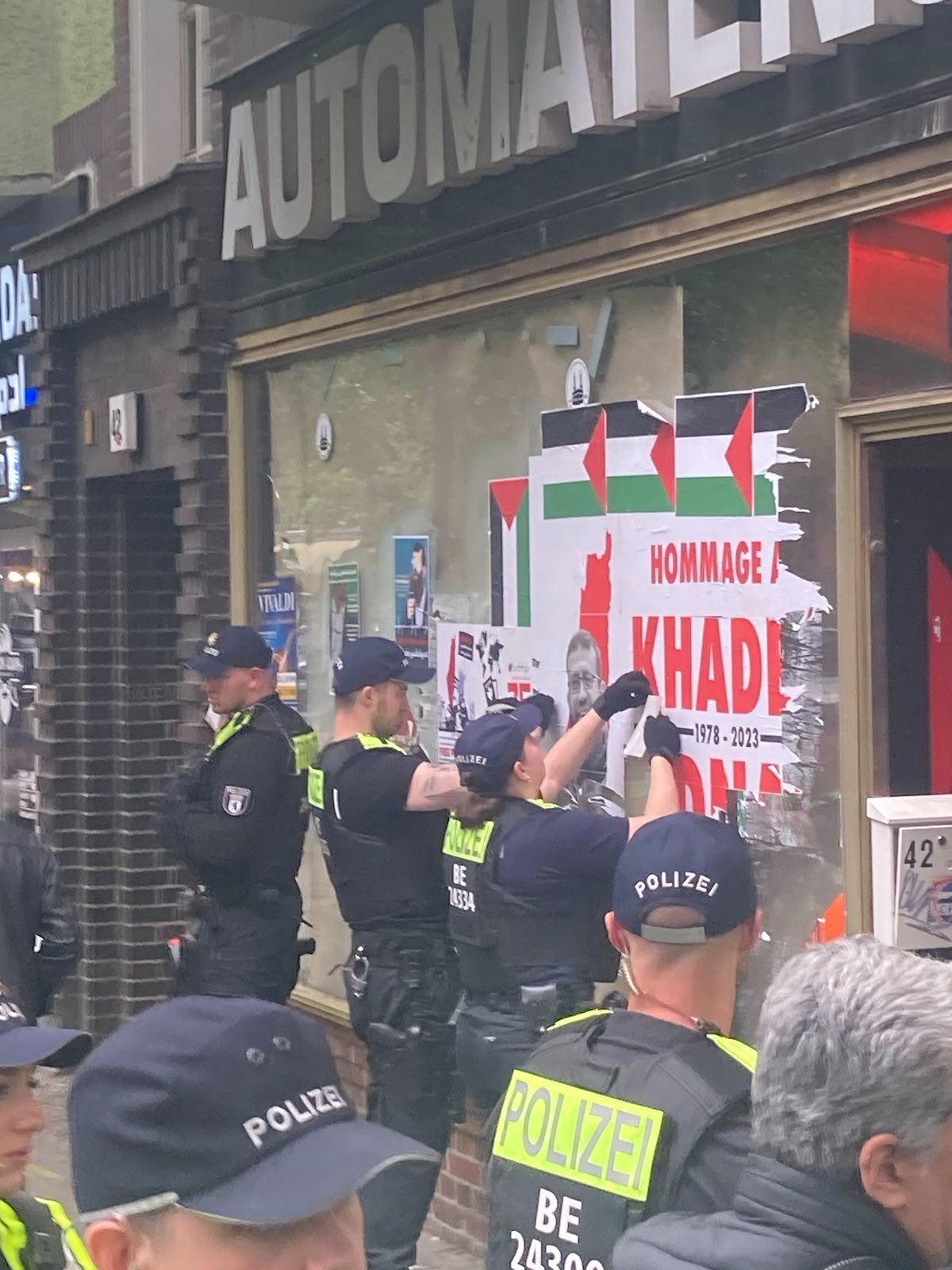
Samidoun stated, at the time of his martyrdom: “Sheikh Khader Adnan was a tireless advocate of resistance, truly dedicated to the Palestinian people. He refused to give up his resistance and his hunger strike until the last moment, committed to his approach of freedom or martyrdom. His martyrdom must become a cry of rage and a commitment to build upon his great sacrifices and dedication to the Palestinian people and the total liberation of the land of Palestine, from the river to the sea.”
Of course, he was not only the popular leader, the struggling mujahid, the freedom fighter, the resistant prisoner.
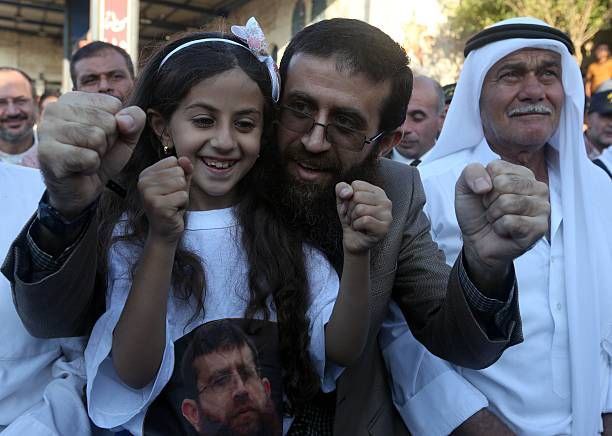
He was also the beloved husband, father and family member, the man about whom his wife Randa said, “Khader sits on the ground and plays with his children, we clean the bathrooms hand-in-hand, he mops the floors, he blow-dries my hair and removes my blackheads. We have a shared life. He is my soulmate. Although I am bearing the brunt of his absence and the fear of losing him, I support him on this journey. As a family, we believe in love for the land. We believe in sacrifice for our land. Our homeland is in need of people like Khader.”
Amid 18 months of genocide, the assassination campaign continues as a primary weapon of the Zionist-imperialist aggression, targeting the leaders of the Palestinian and Arab people. From Sayyed Hassan Nasrallah to Yahya Sinwar, from Ibrahim Aqil to Fouad Shukr to Abbas al-Musawi, from Ismail Haniyeh to Saleh al-Arouri to Fathi Shiqaqi, Abu Ali Mustafa, Abdel-Aziz Rantisi, Sheikh Ahmed Yassin, Imad Mughniyyeh, Yahya Ayyash, Abu Jihad, Kamal ‘Udwan, Mohammed al-Najjar, Basil al-Kubaisi, Kamal Nasser, Wadie Haddad, Ghassan Kanafani, Mohammed Boudia, Basil al-Araj, Tariq Izzedine to Samir Kuntar, amid the martyrs of the prisoners’ movement, including his fellow hunger strikers Abdel Qader Abu Al-Fahm in 1970, Rasem Halawa in 1980, Ali al-Jaafari in 1980, Anis Dawlah in 1980, Ishaq Maragha in 1983, Mahmoud Freitekh in 1984, and Hussain Obaidat in 1992; amid the nearly 700 bodies of the martyrs imprisoned by the occupier, Sheikh Khader Adnan and all of his brothers, sisters and comrades in the struggle continue to point forward on the path to liberation.
“My dear Palestinian people… do not despair. Regardless of what the occupiers do, and no matter how far they go in their injustice and aggression, our victory is close,” he affirmed. At this time of Zionist-imperialist genocide, with mass starvation being used as a key tool of genocide atop 17 years of siege on Gaza, amid the overtly genocidal proclamations of Smotrich, Ben-Gvir, Netanyahu and their cohort, at the time of unparalleled bravery and commitment of the Resistance, his words ring ever true today.
As we remember Sheikh Khader Adnan, two years on, the mandate for our international movement remains the same: to build the international popular cradle of the resistance and to escalate the struggle to impose a cost on the occupier. Today, the people, armed forces, and AnsarAllah movement of Yemen stand as an exemplar of what the power of comprehensive resistance can mean, and the epitome of the boycott movement. Khader Adnan must live on in each of us and our actions, in honor of his sacrifice, commitment and willingness to put his body and life on the line not only for his own freedom, but for the liberation of Palestine, from the river to the sea.
We urge all to organize and act to bring the genocide to an end, to break the siege on Gaza, to free the Palestinian prisoners and to free Palestine from the river to the sea, including participating in the global strike on 15 May to mark the anniversary of the ongoing Nakba.
“I starve myself for you to remain. I die for you to live. Stay with the revolution.” – Khader Adnan
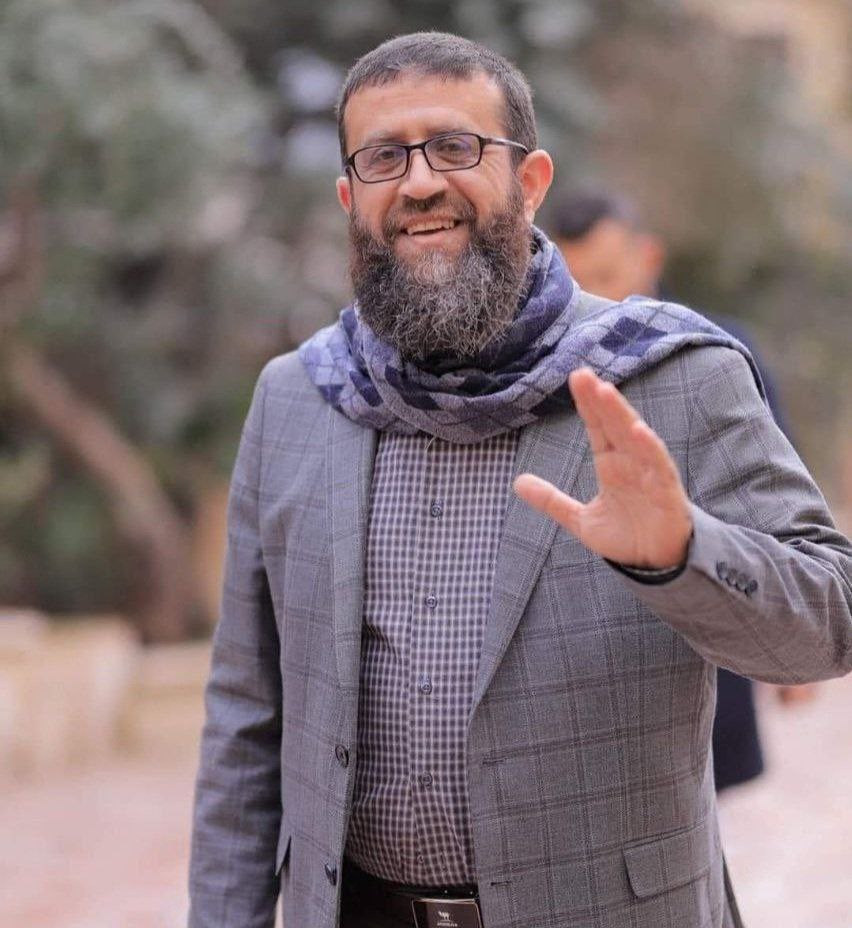
Below we are republishing the will of the martyred prisoner, Sheikh Khader Adnan. He wrote his will on 2 April 2023, one month before his martyrdom, nearly two months into his hunger strike. Khader Adnan was martyred inside Israeli occupation prisons on 2 May 2023 after 86 days of hunger strike and amid a clear commitment of the Zionist entity to end his life. Khader Adnan lives on, an eternal symbol of steadfastness, freedom, dignity and resistance:
In the name of Allah, the most gracious, the most merciful
The Almighty said: “Verily those who say, “Our Lord is Allah,” and remain firm (on that path),- on them shall be no fear, nor shall they grieve and never will Allah grant to the disbelievers a way (to triumph) over the believers.”
Praise be to Allah, Lord of the worlds, for granting me the ability to strike for freedom. Praise be to Allah for His countless blessings, and prayers and peace be upon the master of creation, the beloved of truth, our prophet Muhammad, may God bless him and his family and grant him peace.
I am sending you these words of mine, as my flesh has melted, my bones have gnawed, and my strength has weakened from my imprisonment in the beloved, authentic Palestinian city Al-Ramla. This is my will to my family, my children, my wife, and my people.
My wife, I counsel you and my children to fear Him (Allah), the Most High, to cling to His firm rope, to dispense with His bounty from others, to speak the truth in every time and place, to uphold ties of kinship, to pray and to pay Zakat (alms-giving), to preserve Allah‘s sanctities, and His right to our situation, money, movement, residence, and knowledge. The best homes in Palestine are the homes of martyrs, prisoners, the wounded and the righteous.
I entrust the uncles, aunts, relatives and neighbors to you; everyone who has a right over us. I entrust you with not leaving anyone with a debt over me, moral or material, for your love (me) is most in need of His mercy. If it is my martyrdom, do not allow the occupier to dissect my body, bury me near my father and write on my grave “here (lies) the poor servant of Allah, Khader Adnan, your prayers for him, his parents, and Muslims everywhere”. Make it a simple grave, and ask Allah for forgiveness, mercy, consolidation, and the breadth of my grave, and to make our graves a garden of paradise, not pits from the depths of Hell, and that He accepts all our deeds purely for His honorable face.
Umm Abdel-Rahman, my wife, and the children, Ma‘ali, Bisan, Abdel-Rahman, Mohammed, Ali, Hamza, Maryam, Omar and Zainab. Forgive me and my brothers Abu Adnan, Abu Anas, Umm Nour and all the uncles, uncles, relatives, friends, and neighbors for any shortcomings from me on your side as I leave this temporary life, but make sure that I have not been distracted from you except by Allah’s permission for duty.
O our proud people, I send you this commandment of greetings and love, and I am full of confidence in His mercy, victory, and empowerment.
My greetings to our leaders, our commanders, the families of the martyrs and the prisoners, and my greetings to them and to all the revolutionaries.
Your loving husband, Umm Abd al-Rahman; your loving father, my children; your loving brother, my brothers; your loving son, our people.
I pray that Allah accepts me as a martyr loyal to His honorable face.
Your love, Khader Adnan
David Rovics’ song for Khader Adnan:
“Companion of Martyrs”, an anthem dedicated to Sheikh Khader Adnan, translated by Resistance Music and Media. Performed by the Ezar and Qabas Band in 2023.
Discover more from Samidoun: Palestinian Prisoner Solidarity Network
Subscribe to get the latest posts sent to your email.

